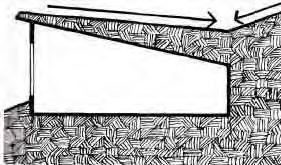Underground Housing: Difference between revisions
Jump to navigation
Jump to search
(removed broken external links (for pictures), other edits; inserted existing image) |
|||
| Line 1: | Line 1: | ||
{{Breadcrumb|Housing and construction}} | {{Breadcrumb|Housing and construction}} | ||
[[File:Earthsheleteredhome.jpg|right|388px]] | |||
''' | |||
<blockquote><center>''"In a hole in the ground lived a hobbit.<br>Not a nasty, dirty, wet hole, filled with the ends of worms and an oozy smell,<br>nor yet a dry, bare, sandy hole with nothing in it to sit down on or eat:<br>it was a hobbit-hole, and that means comfort."''</center></blockquote> | <blockquote><center>''"In a hole in the ground lived a hobbit.<br>Not a nasty, dirty, wet hole, filled with the ends of worms and an oozy smell,<br>nor yet a dry, bare, sandy hole with nothing in it to sit down on or eat:<br>it was a hobbit-hole, and that means comfort."''</center></blockquote> | ||
''' | |||
Please see the page for [[Malcolm_Wells|Malcolm Wells]] for one architect's underground houses. | Please see the page for [[Malcolm_Wells|Malcolm Wells]] for one architect's underground houses. | ||
Underground homes have several advantages over homes built above the ground: | |||
* There is no need to lay a foundation, which saves a huge amount of labour and material | * There is no need to lay a foundation, which saves a huge amount of labour and material | ||
* The walls are earth, so that saves a lot more building material | * The walls are earth, so that saves a lot more building material | ||
| Line 15: | Line 19: | ||
* It can be complemented with a greenhouse that takes advantage of the heat already there (e.g. greenhouse-facing kitchen) | * It can be complemented with a greenhouse that takes advantage of the heat already there (e.g. greenhouse-facing kitchen) | ||
[[File:How not to build an underground house.jpeg|thumb|right|281px|thumb|right|"How '''not''' to build an underground house!"]] | |||
==Underground Greenhouse== | |||
Greenhouses in cold climates must retain moderate temperatures for year-round growing, therefore [[Earth Sheltered Greenhouse|underground greenhouses]] are useful for temperature stabilization (see: [[Walipini]]). | |||
==Mike Oehler's methods== | ==Mike Oehler's methods== | ||
Information about Mike Oehler's methods was removed after OSE received a Cease and Desist letter from the author based on copyright. -MJ 2/17/15 | Information about Mike Oehler's methods was removed after OSE received a ''Cease and Desist'' letter from the author based on copyright. -MJ 2/17/15 | ||
==Linkfest== | ==Linkfest== | ||
| Line 31: | Line 36: | ||
* [http://www.undergroundhomesgazette.com/ Underground Homes Gazette] Articles and info about underground and earth sheltered housing. | * [http://www.undergroundhomesgazette.com/ Underground Homes Gazette] Articles and info about underground and earth sheltered housing. | ||
* Treehugger: [http://www.treehugger.com/green-architecture/green-magic-homes-are-probably-neither.html "Here's the dirt on a prefabricated plastic earth sheltered home design you can buy off the shelf"] | * Treehugger: [http://www.treehugger.com/green-architecture/green-magic-homes-are-probably-neither.html "Here's the dirt on a prefabricated plastic earth sheltered home design you can buy off the shelf"] | ||
* Pictures: [http://www.swansonarchitects.com/wp-content/uploads/2009/01/sustainable_green_architecture_eco_friendly-earth_sheltered_home_thumb.jpg Ziggurat-type] | |||
Revision as of 12:51, 16 July 2016
Main > Housing and construction
"In a hole in the ground lived a hobbit.
Not a nasty, dirty, wet hole, filled with the ends of worms and an oozy smell,
nor yet a dry, bare, sandy hole with nothing in it to sit down on or eat:
it was a hobbit-hole, and that means comfort."
Please see the page for Malcolm Wells for one architect's underground houses. Underground homes have several advantages over homes built above the ground:
- There is no need to lay a foundation, which saves a huge amount of labour and material
- The walls are earth, so that saves a lot more building material
- The thermal mass effect of the earth stabilizes the temperature. Earth cools and heats more slowly than the surrounding air. If you dig 2m (6 foot 6 inches) into the ground, the temperature is always - day and night, summer and winter - steady at that climate's average. A well-designed underground home should need no energy for heating or cooling
- They are easy to build.
- They are unaffected by wind, hail and hurricanes
- Pipes are not exposed to atmospheric temperature and don't freeze
- They require little maintenance
- They are soundproof and relatively fireproof
- It can be complemented with a greenhouse that takes advantage of the heat already there (e.g. greenhouse-facing kitchen)
Underground Greenhouse
Greenhouses in cold climates must retain moderate temperatures for year-round growing, therefore underground greenhouses are useful for temperature stabilization (see: Walipini).
Mike Oehler's methods
Information about Mike Oehler's methods was removed after OSE received a Cease and Desist letter from the author based on copyright. -MJ 2/17/15
Linkfest
- Performance Building Systems, Inc.
- Underground Homes
- SubsurfaceBuildings.com
- Bill Lishman's underground domes, also featured on Treehugger; built with ferrocement and then reburied.
- Wikipedia: Underground Living
- "Earth-Sheltered Housing", Washington Energy Extension Service (1984)
- Underground Homes Gazette Articles and info about underground and earth sheltered housing.
- Treehugger: "Here's the dirt on a prefabricated plastic earth sheltered home design you can buy off the shelf"
- Pictures: Ziggurat-type

